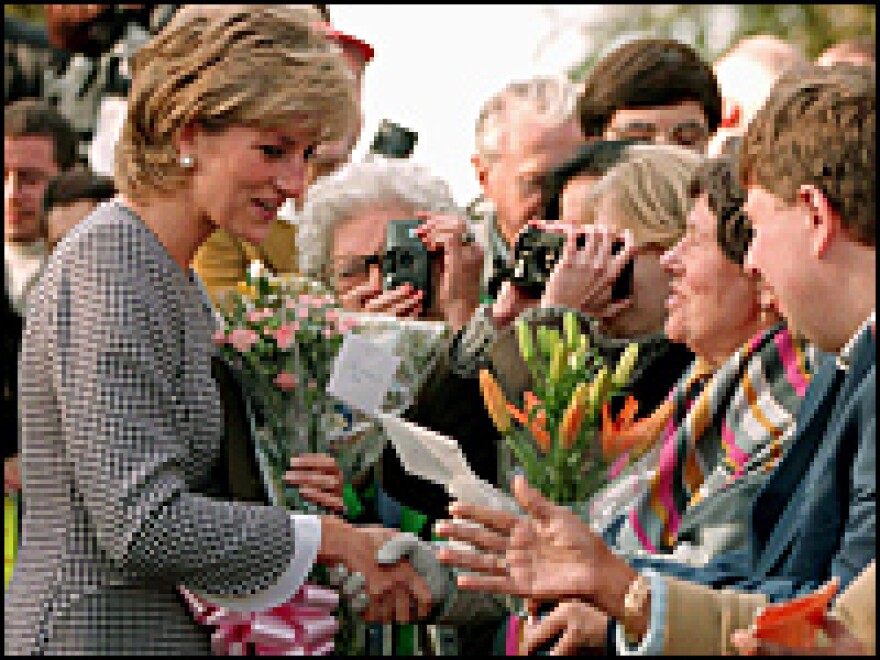From the moment she appeared on the scene, Diana, Princess of Wales, starred in a story that gripped the world. "Shy Di" became an international superstar — part jet-setter and part humanitarian. Along the way, her each and every move was written about, talked about and captured at the end of a photographer's lens.
Now, 10 years after her death, former Vanity Fair and New Yorker editor Tina Brown takes another look at the story of "The People's Princess" in The Diana Chronicles, which hits bookstores Tuesday.
Diana, who was so hounded by the press, also knew how to use it to her advantage from the very beginning, Brown told Renee Montagne:
Tina Brown: When she first was trying to win Prince Charles, she realized she had two constituencies: the royal family — clearly she had to win them — but she also had to win the press. A lot of the press said to me that they really felt, particularly when Charles was on tour in Australia at the very beginning of their relationship, that they watched him kind of fall in love with her through the media, that he understood that the press had to love her because they represented the British people. And when the press fell in love with her, sort of, so did Charles. It always played a big role, and she knew it.
You used an expression that the British monarchy, when she arrived on the scene, had the quality of a British railways cheese sandwich.
Yeah, a British Rails cheese sandwich. It did. I mean, the fact is, at the end of the '70s, England was in a very, very depressed state. The unions were all on strike, the economy was terrible, the royal family were old, and there was nobody interesting to follow. Then along comes this young, beautiful, sweet, feminine young woman. She's a throwback, really, because at that time — this is the time of the Sex Pistols, for God's sake, you know, and here was this girl who was a virgin. I mean, she was the last virgin in England, it seems — I mean, you could only find a virgin in a sit-com at that point. And England kind of glommed onto her. And when she died, it wasn't only the grief for a beautiful young woman snatched so prematurely, who had been so compassionate and kind and glamorous and sad — which made people love her — but also it was the end of that [Margaret] Thatcher era, when [Prime Minister] Tony Blair had just taken over and England was ready for something else. And they felt that Diana had represented feeling and the end of the stiff upper lip, which is the mood England was in. And of course that was what people were expressing when she died.
You do write something quite poignant about the end of Diana. You write that from the grave, Diana achieved something she could never quite manage in her lifetime.
Yes — she made the palace listen to her. She couldn't get through to them. You know, when I lunched with her in July of 1997, she said to me, "I wish I could make them understand that they need to reach out more. They have to show that they are feeling people and they care," but she said, "but I can't get through to them. They need a different kind of advice." And it's very sad that within two months she herself was dead, and they saw she was right, really. And they'd never admit it in public, but they do admit it in private.
Did you like Diana?
I liked her more and more, and by the time I finished the book, I liked her very much. Because I admired her courage. I felt that she'd been served up a far worse deal than I'd even realized, actually. I mean, she took on the House of Windsor and said "I will not be erased, I will not live a life that's a fraud, with a husband who's being unfaithful, and I'm supposed just to go along with it — I'm just not going to go along with it." So I admire Diana. I think what she did was powerful. And I think that what she did with her celebrity, which was to, in a sense, make the template for the sort of global humanitarians of today, with the rock stars like Bono, and Angelina Jolie — she did it first, and I admire that she made so much out of her own pain.
This story contains a portion of Renee Montagne's conversation with author Tina Brown. Excerpts have been edited for clarity.
Copyright 2023 NPR. To see more, visit https://www.npr.org.



